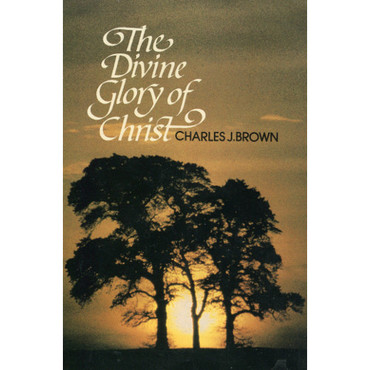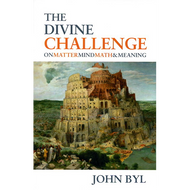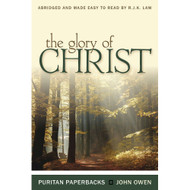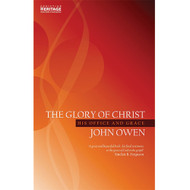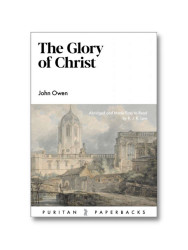Categories
Categories
The Divine Glory of Christ by Charles John Brown
Product Description
Books on the deity of Christ have generally concentrated on the ‘big’ texts of Scripture. In these pages Charles J. Brown presents another line of evidence, often overlooked, which ought to bring the reader of Scripture no less irresistibly to the same vision of Christ’s divine glory. This evidence he terms ‘indirect or incidental’ yet, far from losing its importance on that account, Brown’s unusual approach has a particular force and appeal. In C.H. Spurgeon’s opinion the book, first published in 1867, is ‘small but precious and much to our personal edification’.
Charles J. Brown, who died in 1884, published little in his lifetime. This is the main reason why though foremost among the Scottish preachers of the last century his name is so little remembered today.
About the Author
Charles John Brown, the youngest of the five sons of Alexander Brown, was born on 21 August 1806. His father ran a bookselling business in Aberdeen and was twice Provost of that city. Charles grew up closest to the fourth son, David, and both brothers became assured of a saving relationship to Christ during student days in Edinburgh in the 1820s, where they sat under the ministry of Dr Robert Gordon. It was his conversion that ended Charles Brown’s preparation to be a lawyer and set him on the course that led to his being elected minister of Anderston Church of Scotland, Glasgow, in 1831.
Six years later, in 1837, he became minister of the New North Church in Edinburgh. Almost his entire congregation removed to the Free Church of Scotland at the Disruption of 1843, and they ultimately settled in the building on Forrest Road that remains today. He was minister of this charge until his death in 1884, and it was said of him, ‘Never had any minister a more attached or united congregation; and they have been a highly favoured one.’ C. J. Brown gave his life to the one great purpose of preaching and pastoring, and in that capacity he was the equal of the most eminent men of his day. W. G. Blaikie says that he ‘was decidedly ahead of [his brother, David] in preaching gifts and spiritual power . . . An animated, incisive, and very spiritual preacher.’
At the Disruption of 1843, ministers and elders of the Free Church first gathered in the Tanfield Hall, Edinburgh, and it was in that building, the following Sunday afternoon, that C. J. Brown was called upon to preach to three thousand. His text was, ‘I have set watchmen upon thy walls, O Jerusalem; which shall never hold their peace, day nor night.’
With the inevitable controversy that accompanied the events surrounding the Disruption there was a concern among the Free Church leaders that the priority of personal devotion to Christ could be displaced. For that reason, in the following year, the General Assembly of May 1844 was preceded by a day of humiliation and prayer and for the first meeting of the day, prior to discussion, Charles Brown was asked to preach. He took for his theme the minister’s responsibility and aim, on the basis of the words, ‘I will stand upon my watch, and set me upon my tower, and will watch to see what he will say unto me, and what I shall answer when I am reproved’ (Hab. 2:1). The message of that Tuesday in May 1844 was long to be remembered. Brown began by reminding his hearers that the purpose of their meeting was ‘not so much to speak to one another as to speak to the Lord our God, and pour out our hearts before him in sorrowful confession of our many, many short comings and sins’; and this in order that it might ‘please Him in infinite mercy to make some use of us as His instruments in the great work on which His heart is set, and for which the Son of God died’. He went on: ‘How is a minister to teach others the ways of God unless he is walking close and straight in them himself? How shall he lay open the sins of others, not harshly but tenderly, unless he is seeing and mourning in secret over his own.’ Eight lines of thought were then taken up, before he concluded with the verses of Isaiah 6 – ‘Woe is me, for I am undone’ – then the live coal taken from off the altar, the iniquity taken away, and the words, ‘Whom shall I send, and who will go for us? Then said I, Here am I: send me.’ Before the sermon concluded we read that, ‘Many a head was bowed, and here and there amidst the Assembly men were silently seeking relief in tears.’
The discussion that was expected did not follow. Instead, after a few words by Dr Chalmers, there was silence: ‘In vain the Moderator invited further discussion. Men’s hearts were full; the Assembly remained for a time in hushed silence. It seemed as if members were afraid to disturb the solemnity of the scene; as if it would be best for each to retire and enter into his closet, and shut the door behind him. At a quarter past two o’clock the blessing was pronounced, and men went to their homes.’
It is only from such fragments as this that we gain a glimpse of the man who was made a D.D. by Princeton in 1863. Of his participation in the Kilsyth revival of 1839, his congregation’s evangelistic outreach into the Cowgate area of Edinburgh, his occasional printed addresses, and his support for Moody in 1874, of all these and much else we know little.
Brown was Moderator of the Free Church General Assembly in 1872. His only books were The Divine Glory of Christ (1868) and The Way of Life (1874), both of which were made up of sermons. These are valuable books although they cannot, as one who heard him comments, ‘give a full idea of his liveliness and warmth in the pulpit’. The same writer says of his opening prayer on Sunday mornings: ‘We have heard it said of it by more than one, that they could have gone home with the feeling that they had received spiritual strength from it for many days, so full was it of true devotional spirit and communion with God . . . In his lectures and sermons there was a rare combination of intellectual power and spiritual earnestness, proceeding from a mind and heart full of the treasure of the Word. Truly the Word of Christ dwelt in him richly in all wisdom, so that alike in the pulpit and at the Communion Table, at his prayer meetings, in his classes, in family visitation, and at the sick-bed, he fed his people with what had first enriched his own soul.’
The Ministry, a collection of Brown’s addresses to students of divinity, published by the Trust, survives as a statement of what he saw as the essence of the gospel ministry.
Endorsement
This is one of the best books written concerning The Lord Jesus Christ. It is very easy to read and understand. It also proves scripturally beyond doubt that Jesus Christ is God in the flesh.. but the author does it using lesser quoted scriptures which I liked. Buy this book, it is a treasure.
 Loading... Please wait...
Loading... Please wait... 
